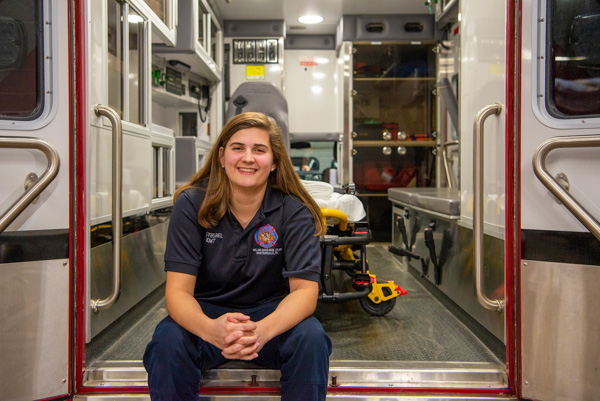Emergency management student thrives outside comfort zone
Wednesday, December 16, 2020
Juggling full-time college classes by day and full-time emergency medical technician work by night, Brooke M. Strubel is earning her Bachelor of Science degree in emergency management and homeland security in just two and a half years. For a young woman who recommends getting out of your comfort zone to achieve your highest potential, this past year, intensified by a global pandemic, has offered an ideal environment in which to enhance her people-centered skills.
“I never thought that I’d be working during a pandemic … but it’s an experience that I won’t forget,” said the soon-to-be Pennsylvania College of Technology graduate from Strasburg. “Challenges get you out of your comfort zone, and that is the area in which you will find yourself, your passions, your strengths and, yes, even your weaknesses. This is the area in which you will thrive and improve. Everything you learn advances your knowledge and leads to personal and professional growth.”

Graduating magna cum laude, Strubel is also earning a minor in criminal and restorative justice and was selected to receive the Academic Vice President and Provost’s Award for scholastic achievement and service. She was set to participate in Fall 2020 Commencement ceremonies on Dec. 19, but due to COVID-19 restrictions, the event has been postponed. As with many adaptations this past year, Strubel takes the delay in stride; besides, she’s too busy taking care of others to think about herself.
Throughout 2020, Strubel has worked full time for Ephrata Community Ambulance and completed her Penn College degree requirements online.
“I managed to balance work and school by working night shift full time and then being able to handle my classes either in the morning before I went to bed or right before I went into work,” she explained.
“It still could be hard, but luckily, I’ve been granted the gift of time management skills and being organized.”
Prior to this year, Strubel worked and resided at the Willing Hand Hose Co. in Montoursville through a “live-in EMT” program, attended classes on the Williamsport campus during the week, and traveled home to Lancaster County on weekends to work at the Ephrata station. She also completed an internship in a trauma unit at Hershey Medical Center.
To complete her bachelor’s degree in just two and a half years instead of the standard four years, she took credit overloads and summer courses and was also able to transfer some credits from earlier academic efforts.

Strubel earned her EMT certification and Fire Fighter 1 training as a high school senior.
“Ever since I was little, I was always fascinated with the people that chose to help others during emergencies,” she said. “At first, I chose to ignore this passion, as I thought it was more of a masculine field. When I got to my junior year (in high school), I decided I couldn’t ignore it anymore, and I started my journey to become a first responder. Then, I found out that there was a broader way to make decisions that can save lives and help communities in the face of major disasters, and that was something I had to get involved in.”
That “something” was Penn College’s emergency management and homeland security major, a degree preparing graduates to manage the many phases of emergencies, disasters and crises.
“Emergency managers look at the broad coordination piece – the big picture, but many people don’t see this aspect of emergency response because it’s accomplished behind the scenes,” Strubel said. “If you don’t want to be a first responder, you can help in different ways with coordination of operations.”
Emergency management positions exist at all levels of government, in public health departments and health-care agencies, in nonprofit and faith-based organizations, and in a broad range of fields from transportation and energy to business and education.
“There are many behind-the-scenes professionals benefiting society and so many job opportunities,” Strubel said. “Often, people just think of natural disasters, but there are disasters caused by people and technology, as well. Emergency managers deal with continuity of operations on a lot of levels, including the supply chain.”
The young emergency response professional says she’s leaving Penn College with a range of skills and lifelong friendships developed through the bonds that emerge during training exercises and real-life emergencies.
“I have truly been blessed to merge all my knowledge together,” Strubel said. “The hands-on learning really attracted me to Penn College. I found that the best way for me to learn something is to get the experience of actually doing it. Through my semesters of study, I’ve been given the opportunity to participate in mock scenarios, training exercises and engaging professional discussions. That experience, paired with my instructors’ knowledge, couldn’t be beat anywhere else.”
When asked about a standout moment during her education, she offered: “I flash back to one of my major’s basic classes, which was the Incident Command Systems Operations class. In this class, we went through multiple scenarios of disasters in Williamsport. We each got to play through the roles of every ICS position as we had to manage disasters (and make decisions) that theoretically would save people or kill them. The high stress gave each student in the class a bond we didn’t have before, and it was really cool.”
 Living at the Montoursville fire station with other young EMTs, including students enrolled in Penn College’s paramedic program, also led to close bonds due to responding to emergencies together or simply sharing a meal in the station’s kitchen.
Living at the Montoursville fire station with other young EMTs, including students enrolled in Penn College’s paramedic program, also led to close bonds due to responding to emergencies together or simply sharing a meal in the station’s kitchen.Strubel says she didn’t miss the typical social activities enjoyed by college students.
“Our adrenaline is different when we’re on (emergency response) calls. It’s all the fun we need. I wouldn’t trade it for the parties. It’s worth it,” she said.
Strubel envisions exciting developments on the horizon as she takes steps toward including law enforcement training in her wide range of skills. She plans to attend the Pennsylvania Municipal Police Officers’ Training Academy to earn her Act 120 certification.
“I truly believe that my life is leading me in that direction to help more people and provide faster medical attention, as police officers are often on the scene first, and to promote positive change and unity,” she said, adding that she plans to continue “a strong emergency management role” in whatever capacity in which she finds herself engaged.
To learn more about Penn College’s emergency management and homeland security major, call the School of Business, Arts & Sciences at 570-327-4521.
For more about the college, a national leader in applied technology education and a special mission affiliate of Penn State, email the Admissions Office or call toll-free 800-367-9222.